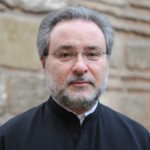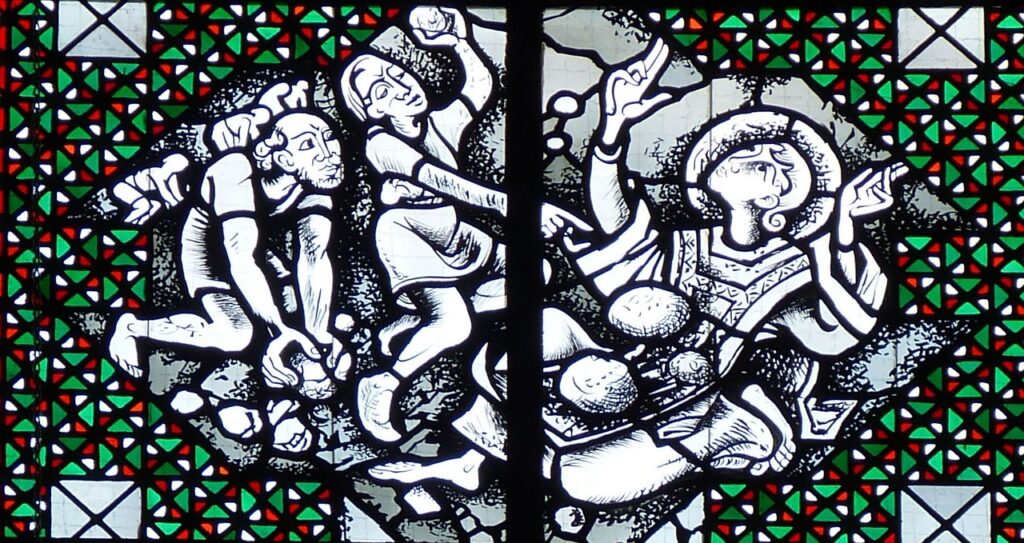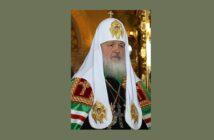Source: Public Orthodoxy
by Rev. Dr. John Chryssavgis
Executive Director of the Huffington Ecumenical Institute at Holy Cross School of Theology
In previous years, weeks, and days, I have seen—and, in one instance, supported—a variegated condemnation of the Moscow Patriarch—his preaching and practice alike—as heretical. The “Russian World” ideology has been denounced as unorthodox and heretical. The “Edict” of the World Russian People’s Council has been characterized as distorted doctrine. And the commemoration of Patriarch Kirill has been called in question. All of the above have been justly promoted and justifiably promulgated, among others, by dear friends across the globe. While I am not in the least taking issue with my colleagues, desperate to address the inconceivable degeneration to which an Orthodox Church could possibly descend, I wonder nevertheless if this is the only or best approach. It would be commendable if Orthodox Bishops were to condemn the Patriarch of Moscow with forceful conciliar consensus, just as it would be admirable if Orthodox Christians were to set in motion a courageous chain reaction of standing up to or protecting themselves against a despotic pastor who himself has strayed (Psalm 118.176). But when does heresy-hunting count or even matter?
One Western theologian has described “heretical” as “weird beyond belief”! And this is arguably true of many who ironically consider themselves “orthodox.” Heresy and orthodoxy are not theoretical concepts or ideological worldviews that are always rigidly clearcut or mutually exclusive, just as the lifestyles of saints and sinners can include both virtuous and vicious behaviors. Christians are supposed to be, to paraphrase the second-century Letter to Diognetus, “indistinguishable by nationality, language, or custom. They do not inhabit cities of their own, or speak foreign dialects, or have a different social conduct.” Christians are part and parcel of a wider community, blending into society rather than separating or segregating themselves from society. They respectfully acknowledge that “orthodoxy” and “heresy” are far more fluid realities than people like to presume or promote. And they are inclined to avoid leveraging these as arsenals to dismiss those with differing opinions. If we have learned something from centuries of heresies addressed by councils and confessions, it is that we should never be entirely confident or absolutely convinced about the boundaries of truth and the church!
I suspect that casting heretical aspersions—brandishing the tag of “heresy” or boasting the hallmark of “orthodoxy”—may for some conceal a simplistic, if superficial escape from questions that should be addressed to all of us as Orthodox Churches and Christians. The term “heresy” does not only indicate false teaching or erroneous choice. More precisely and more properly, it signifies a reduction or restriction of the fullness of faith. I prefer the “apophatic” definition of “dogma and heresy” advanced by Christos Yannaras in his Elements of Faith: An Introduction to Orthodox Theology (Edinburgh: T&T Clark, 1991), where he maintains that “heresy is a selection and preference of one part of the truth to the detriment of the whole truth” (p. 15). In other words, “heresy” is the exaggeration of one—otherwise noble and possibly harmless—dimension at the expense of the catholic truth. In the case of the ideology of the “Russian World,” it may involve the idolization (instead of appreciation) of art and culture; in the case of the edict of the “Russian People,” it may include a utopian (rather than harmonious) relationship with society and state.
Nowhere is this more evident than in the unfortunate nationalistic tendencies that tarnish the Orthodox Church. And in this regard, Russia is hardly the exception. In 1872, the Council of Constantinople—referring to “secretive” and “schismatic” (unchristian and uncanonical) activities of the Bulgarian Exarchate as “racial discrimination and nationalistic dissension,” albeit stopping short of adopting the term “heresy”—prominently and permanently denounced the extraneous encroachment of ecclesiastical territory and unsolicited infringement of canonical jurisdiction. In so doing, it primarily defined an internal problem within Orthodox Christianity itself, “placing its finger [so to speak]on the mark of the nail.” How many Orthodox Churches are guilty of contention or competition as a result of phyletism? How many Orthodox Churches tend toward glorification of nation and state? How many majority-Orthodox nations confound worship of God and salute to the flag?
Could it be that most, if not all Orthodox Churches are in fact much closer than they might concede to the perverted Russian ideology? Consider the “great idea” of Byzantium or its manifold diluted derivatives that have emerged historically—and periodically continue to rear their hideous facade—in Greece, Serbia, Romania, Bulgaria, Georgia, and Ukraine. Could it be that Orthodox Christianity in traditional motherlands—much like among converts in the so-called diaspora—is more comfortable within the subservience of autocracy and less confident within the independence of democracy? There is a pervasive and pathological virus that seems to infect all Orthodox Churches when it comes to ethnocentrism and church-state relations. The fact is that so many of our churches and hierarchs—indiscriminately across the jurisdictional smorgasbord—actually have more in resemblance to than in disparity with Moscow and Kirill than we like to think or want to admit. The difference is essentially one of degree than of kind. And if this is true, then who can be justified in “casting the first stone” of “heresy”?
Accusations of heresy naturally arise for all kinds of reasons, not just religious or spiritual, but often also political or personal. Anyone with a different position is invariably and effortlessly cast as unorthodox or heterodox. In this respect, decrying Patriarch Kirill as preaching heresy may be no different or better than the hubris—because, after all, heresy inherently reveals arrogance and vainglory—that incites the Russian prelate so brazenly and disdainfully to denounce Western decadence as “immoral” and “corrupt” or Ukrainian sovereignty as “apostasy” and “erosion of Orthodoxy,” while defending Putin’s aggression as “a holy war” or “metaphysical battle” in defense and in support of “Holy Russia.”
Sometimes it may be simpler—and ultimately more transparent, truthful, and trustworthy—if we were sufficiently humble and respectful as to leave God out of the equation. I would stand by this as a valid universal principle for avoiding any form of collusion between “the things that are Caesar’s and the things that are God’s.” A theologian is a better theologian when s/he isn’t compelled to “justify” God in order to defend a particular worldview. A scientist is a better scientist when s/he isn’t obliged to “explain” God for the sake of advancing a particular universe. Even a secular politician is rendering a disservice to constituents when resorting to a “religious” explanation of some calamity or catastrophe.
Resisting the introduction of a metaphysical or spiritual dimension to the crookedness and corruption of Patriarch Kirill does not mean overlooking his conceited words and contemptible actions. It demands calling him out by naming his injustice, rather than merely blaming his infidelity. It is far more imperative and compelling to be clear and candid, to call a spade a spade. We should not be afraid to censure him for what he is: a political bully and a war criminal. Which is precisely what so many Orthodox Churches appear incapable of mustering the strength and spine to do. Why is it worse for Kirill to be labelled a schismatic apostate than a brutal autocrat?
Perhaps the fact that many Orthodox Churches, with the exception of Constantinople, have been so reluctant or intimidated to level any criticism whatsoever against Moscow reveals an agonizing, albeit unavowed acknowledgement that they too are fundamentally plagued by the very same vulnerabilities and flaws. They, too, could be branded as heretics. Here’s the thing: the Orthodox Church gave birth to Kirill and his offspring; the tragedy is that we as “orthodox” tend to breed Kirills and his ilk. Believing otherwise—dismissing Kirill as a bad apple in a predominantly wholesome batch—is to be locked up in a bubble of self-complacency and self-conceitedness.
In the end, as Orthodox Churches and Orthodox Christians, we are called to do more than condemn or refrain from commemorating a dishonorable leader. I would argue that we are obliged to pray more intensely and more persistently for such deplorable leaders. That’s the difference between a church community and a political party. It is not so much that the likes of Patriarch Kirill embrace a distorted notion about God. It is that Kirill and his minions, past and present, don’t even believe in God; they believe in nothing beyond their own authority and power.
Could this be why the Ecumenical Patriarchate has not removed Patriarch Kirill from the canonical diptychs? God knows, as we are constantly reminded, that the Phanar should not lay any claim to infallibility or immunity. Yet it stands firmly behind a long tradition and tested practice when it comes to the commemoration of other ecclesiastical leaders, including the Patriarch of Moscow. Part of the responsibility of retaining communion involves facing ourselves candidly as Orthodox Christians—warts and all—instead of curtly rejecting the parts we tend to dislike or cutting off the parts we choose to disown. Maintaining communion means looking into the mirror, owning who and what we are. And, frankly, a lot of it isn’t very pretty.
I never thought I’d be admitting that there may well be some matters best left to bishops. Patriarch Kirill should be grateful to the Phanar—as, indeed, to the countless forbearing and forgiving faithful of the Moscow Patriarchate, inside and outside of Russia—for their genuinely canonical, pastoral, and indulgent stance. At the close of this period of Great Lent, the rest of us should continue to “pray without ceasing” for the reconciliation of all and for the understanding to “see our own faults and not to judge our brother.”
ABOUT AUTHOR
 The Rev. Dr. John Chryssavgis was born in Australia and studied theology (University of Athens) and Byzantine Music (Greek Conservatory of Music). He completed his Ph.D. at the University of Oxford.
The Rev. Dr. John Chryssavgis was born in Australia and studied theology (University of Athens) and Byzantine Music (Greek Conservatory of Music). He completed his Ph.D. at the University of Oxford.
After spending time on Mt. Athos, he served as Personal Assistant to Archbishop Stylianos in Australia, where he co-founded St Andrew’s Theological College and taught at the University of Sydney. Subsequently, he was appointed Professor of Theology at Holy Cross School of Theology and directed the Religious Studies Program at Hellenic College.
The author of many books and articles in several languages on theology, spirituality, and ecology, Fr. John’s publications include three volumes of collected works by His All-Holiness Ecumenical Patriarch Bartholomew, whose biography by Fr. John was published by Harper Collins.




